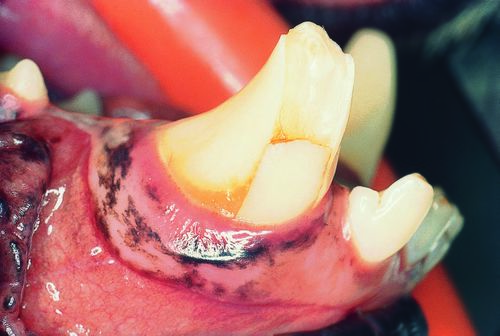Difference between revisions of "Veterinary Dentistry Q&A 06"
Jump to navigation
Jump to search
Ggaitskell (talk | contribs) |
|||
| (One intermediate revision by the same user not shown) | |||
| Line 1: | Line 1: | ||
| + | {{Template:Manson | ||
| + | |book = Veterinary Dentistry Q&A}} | ||
| + | |||
[[File:Vet Dentistry 06.jpg|centre|500px]] | [[File:Vet Dentistry 06.jpg|centre|500px]] | ||
| Line 13: | Line 16: | ||
This type of fracture can be treated; however, follow-up maintenance of oral hygiene is very important. | This type of fracture can be treated; however, follow-up maintenance of oral hygiene is very important. | ||
| − | |l1= | + | |l1=Tooth Fractures |
|q2=What type of restoration may be used? | |q2=What type of restoration may be used? | ||
|a2= | |a2= | ||
| Line 25: | Line 28: | ||
**Secondly, the full crown allows better restoration of the anatomy of the tooth. This can help to prevent further periodontal problems caused by food entrapment into a periodontal pocket that may be created by the loss of attached gingiva. | **Secondly, the full crown allows better restoration of the anatomy of the tooth. This can help to prevent further periodontal problems caused by food entrapment into a periodontal pocket that may be created by the loss of attached gingiva. | ||
| − | |l2= | + | |l2=Tooth Fractures |
</FlashCard> | </FlashCard> | ||
Latest revision as of 16:37, 13 October 2011
| This question was provided by Manson Publishing as part of the OVAL Project. See more Veterinary Dentistry Q&A. |
This patient was presented for a fractured tooth.
| Question | Answer | Article | |
| What are the considerations when assessing this fracture? | This fracture extends below the gingival margin; it is therefore called a crown–root fracture. There has been some compromise of the attachment of the attached gingiva. This type of fracture can be treated; however, follow-up maintenance of oral hygiene is very important. |
Link to Article | |
| What type of restoration may be used? | After endodontic treatment has been performed, options for treatment include restoration of access and fracture sites or full-crown restoration.
|
Link to Article | |
